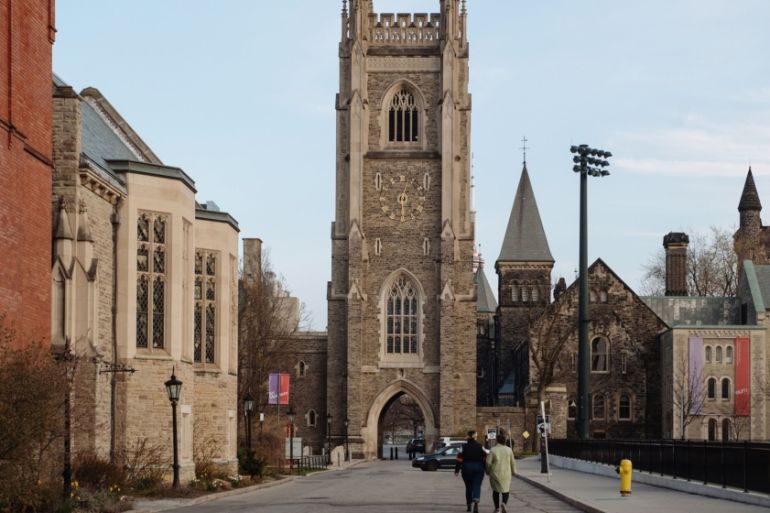‘Anti-Palestinian racism’: Appointment row at Toronto university
University of Toronto’s law school allegedly blocks hiring of scholar due to her work on Israel’s human rights abuses.

Toronto, Canada – Students and teachers at the University of Toronto have called for the reinstatement of an international scholar’s job offer after it was allegedly rescinded by management over her work on Israel’s human rights abuses in the occupied Palestinian territories.
The university’s law school has been accused of blocking the hiring of Valentina Azarova as director of the International Human Rights Program (IHRP) following pressure by a sitting federal judge, who is also a major donor to the faculty, according to emails seen by the Toronto Star newspaper.
Keep reading
list of 4 items‘Greater than an encampment’: Why Gaza student protests strike a chord
Police remove protesters camped at Fordham University
Activists say UCLA Palestine encampment assault followed days of harassment
In an email sent to law school Dean Edward Iacobucci on September 12, also seen by Canadian daily The Globe and Mail, two former directors of the IHRP programme said the school made an offer to Azarova that she accepted in August.
However, when a judge in the Tax Court of Canada, whose name has not been disclosed, expressed concerns about Azarova, Iacobucci rescinded the offer, media reports said on Thursday.
The decision led to a series of resignations at the university, including law professor Audrey Macklin, who chaired the hiring committee that unanimously found Azarova to be the best candidate for the position. On Thursday, a second member of the committee, Vincent Wong, resigned.
The IHRP programme’s three-member advisory board – Vincent Chiao, Trudo Lemmens and Anna Su – have also resigned.
‘Apologise for improper interference’
More than 100 IHRP students and alumni have also sent a letter to Iacobucci, calling for a “thorough and public review of donor practices at the law school, as well as of the alleged improper external influence and pressure by, in this case, a member of the judiciary”.
“As a public institution, the Faculty should not be swayed by wealth and influence at the expense of academic freedom and fair and accountable hiring practices,” said the letter, calling on the “Faculty to reinstate Dr Azarova’s offer” and “to apologise for this improper interference in the hiring process”.
“As students, we look to the IHRP to engage with pressing international legal issues, including Israel’s occupation of the Palestinian territories,” the letter read.
“Dr Valentina Azarova’s scholarship on this topic is principled and reputable. She was unanimously selected by the hiring committee after months of consideration.”
Azarova, an international legal practitioner and researcher, told The Globe and Mail she was offered the IHRP director’s position and accepted it in August through a Zoom call.
She has held positions at several universities, including in the occupied West Bank, with immigration detention, arms trade, and occupation and annexation being her areas of research.
|
|
However, in a letter sent to the Faculty of Law on Thursday and shared with Al Jazeera, Iacobucci denied any offer was made for Azarova.
“Even the most basic of the conjectures that are circulating in public, that an offer was made and rescinded, is false,” he wrote, adding that he “would never allow outside pressure to be a factor in a hiring decision”.
Iacobucci said conversations with a candidate were ongoing, but no offer of employment was made due to “legal constraints on cross-border hiring” within the timeframe required.
“Other considerations, including political views for and against any candidate, or their scholarship, were and are irrelevant,” he wrote.
Kelly Hannah-Moffat, vice president of human resources and equity at the university, told Al Jazeera the “hiring process for IHRP director, which is a managerial staff position, not a faculty one, was confidential”.
“[And] the university is continuing to do its best to maintain confidentiality, notwithstanding insinuations and the selective discourse of information,” she said.
‘Anti-Palestinian racism’
Dania Majid, president of the Arab Canadian Lawyers Association (ACLA), said Iacobucci’s denial that an offer was made to Azarova was “appalling” considering that members of the hiring committee had resigned in protest.
“He is throwing his faculty under the bus for an error he has made. It’s unacceptable,” Majid told Al Jazeera.
“It has sent a terrible message to the students at the law school, faculty members, to all prospective Palestinian students, that their voices, their opinions are not welcome on campus and he will not be there to defend their rights to express those opinions if they were to come under attack.”
Majid said the controversy came as no surprise since “anti-Palestinian racism is alive and well in legal institutions as it is in other institutions”.
“This is a story of how Palestinian voices, Palestinian academics or those who work on Palestine are specifically targeted in order to delegitimise the Palestinian voice,” Majid said.
The ACLA has demanded that the law school report “this matter of interference” to the Canadian Judicial Council and an investigation should be conducted.
Corey Balsam, national coordinator for Independent Jewish Voices Canada, said the incident is indicative of “a broader chill being felt throughout the North American academia”.
“Those who openly criticise Israel and support justice for Palestinians are finding themselves under attack left, right and centre,” he told Al Jazeera.
Balsam said pro-Israel groups have intensified their attacks to force universities to adopt the International Holocaust Remembrance Alliance’s (IHRA) controversial redefinition of anti-Semitism that includes certain forms of criticism of the Israeli state.
“It’s likely no coincidence that the incident with Azarova occurred at University of Toronto, which has been one of the main targets of this campaign in Canada,” Balsam said.
A bill to adopt the redefinition is currently before the Ontario state government, with Majid being “very concerned” about it.
“What does that mean for those who are doing work on Palestine? They are going to come under attack [if they] speak up for Palestinian rights.”